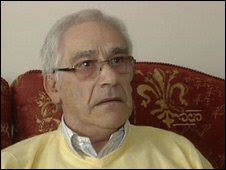I have been thinking lately that Burnt Oak's past was clearly more illustrious than its present. The clues are there in the grand building on the junction of Stag Lane and the Broadway - once a Co-op department store! A department store, in Burnt Oak, I ask you! And in the fact that Burnt Oak once had a cinema - actually, two, it transpires. I knew this from seeing a picture of one of them on Rog T's blog.
Roger is running a great quiz at the moment about the history of Barnet. In the course of this post I will reveal the answer to one of his questions. That can't be helped really and, to be honest, not that many people read this blog - if you are here, your reward is a head start in Roger's quiz!
Back to my friend. Tonight he painted a moving picture of a hidden, substantially lost, history of Burnt Oak. I will find a way to record it less ephemerally than I can here - an oral history project, or even a guided walk: "Working class Burnt Oak" - no, they won't come flocking, but to me and perhaps to a few other people this story is fascinating.
Just a few details that stood out for me:
My friend's mother had no washing machine. A man came around the houses and rented them a washing machine for a couple of hours. He'd wheel it off his van and into their house and come back and collect it later. If they had an extra 9d (9 old pence) to spare, they could also hire a spinner to dry the clothes. His family had no fridge, they kept perishables in their 'larder' in the back garden - a hole dug in the ground!I'm really stirred by this picture. It's not that long ago, and it's not some kind of Gothic horror story, where everyone wallows around in Dickensian squalor. But it does seem to me to be a completely lost world.
Every Saturday and Sunday morning a fleet of 8 or 9 coaches would wait outside the Bald Faced Stag pub to take families to the seaside in Essex or Kent for the day. You bought your ticket at one of the local shops.
There were many factories along the Edgware Road, some related to the aircraft industry, some manufacturing domestic goods - there was, for example, a big Frigidaire factory making, you guessed it, fridges.
Most people did not go to central London often; my friend went there once or twice a year. All their entertainment was local: a trip to one of the innumerable cinemas in the area, or to the Golders Green Hippodrome, or to Hendon dog track. London Undergound's sports ground was next to the tube line, and included several football pitches and a running track. There was even a Burnt Oak Labour Club! Halcyon days, indeed.
There were notorious gangs of local kids, including the Burnt Oak mob, who had rumbles with gangs from other parts of London, eg, Canning Town.
And, yes, kids played safely outdoors in the streets at all hours, and everyone knew their neighbours.
What has changed? The ethnic make-up of the area has changed, but that doesn't look to me to have been decisive. Most families were white English, but not all. My friend says there were many Irish families living in the area (I knew that already) and some Caribbean families.
As far as I can see, the major change has been the loss of the local jobs, and with them much of the heart of the community. People are more geographically mobile these days, which has its advantages, but it also gives people less stake in their neighbourhood.
Another change that seems to me very important is the level of consumption. I think this is a mixed blessing. It is wonderful that most people today have, almost as a human right, a fridge, a washing machine... But do we all of us need to have a car? And I don't mean does every family need to have a car, I mean does every single member of every family need to have a car?
It's not so much the amount of consumption that is problematic, but the way we consume: at home, in private. The social sphere has lost out badly to private consumption, as public transport has lost out to the car culture. I think we are the worse off for that.
Illustrative of this whole story for me is the fate of the Hendon dog track. Dog racing might seem a pretty lowbrow pursuit, but at least a trip to the dogs was a social event. What replaced Hendon dog track (and several homes, which were compulsorily purchased)?
Brent Cross shopping centre, for heaven's sake! Very exciting in its heyday, the first of its kind, but now the shopping centre is so ubiquitous we don't seem to be able to build a new school without including one in the plans somewhere.
You can argue, I suppose, that people - including my friend's family - needed somewhere to go to buy their new fridges, but I think I would prefer the world we have lost, with its cinemas and dog tracks, sports grounds and weekend coaches to the seaside. Burnt Oak is a sight sorrier for the loss of all this.







No comments:
Post a Comment